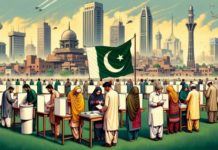(This essay originally posted in Urdu-language Daily Jeddojehad . Translation from Urdu: Rabia Aslam)
According to the UN definition: human rights are the rights that all human beings have, regardless of race, gender, nationality or religion, whatever language they speak and regardless of their social status. These rights include the right to life and liberty, freedom from torture and slavery, freedom of expression, the right to work and education, and many other rights. Everyone has the right to freedom of expression and expression before the law.
Micheline Ishay has also given a similar definition of human rights: Human rights are the rights that every human being has simply because they are part of mankind. These rights are enjoyed by all on the basis of equality, regardless of one’s gender, race, nationality or economic class. These rights are universal.
If we look at these two definitions, many questions remain unanswered. It is not easy to come up with a comprehensive and an all-inclusive definition of human rights. One reason is the fact that the Liberals and the Marxists, for instance, who can justifiably claim the legacy of human rights struggles, disagree on the question of economics.
Likewise, over time, the human rights activists and scholars have added new dimensions. Environmental justice groups, for example, would argue that fresh air is a basic human right.
Hope is being called a human right. It is as if you are living in a human society where you are deprived of ‘hope’ for the future, this will be considred a violation of your human rights. Thus, human rights is an expanding concept.
Similarly, we see liberals talking about equality, but they don’t argue an equality in the realm of economy. Marxists or anarchists rightly point out that without economic rights, political and social rights and personal freedoms become rather hollow. Both factions, however, seem to agree that human rights cannot be protected without secularism.
This short article will also argue that human rights cannot be achieved without secularism and socialism. Why?
For an answer to the above we need to find out: how to identify the human rights violations?
This is not a difficult task in light of the above mentioned definitions of human rights. The simplest and most rational way to determine human rights violations is that if an individual or group is being discriminated against or their personal liberty is being taken away, it is tantamount to a violation of human rights.
Arguably, secularism and socialism are the pre-conditions if such discriminations are to be averted.
Let’s talk about secularism first.
Secularism is oxygen to human rights. Secularism is a European ideology. There were various reasons for the rise of secularism in Europe. One important reason was the years-long religious war. From 1618 to about 1648, a nearly thirty-year war between Protestant and Catholic nations had left Europe in shambles.
With the help of a peace treaty in Westphalia in 1648, peace was established the religious minority was granted religious freedom. It was also recognized that the minority community would have the right to seek refuge in another country while no king/state would bribe followers of another faith to convert.
Another important reason was that kingdoms and churches ruled in synergy, and monarchy was justified by way of religion. The bourgeois revolutions reduced the monarchies either to constitutional role or in certain cases monarchies were dismantled. Since the kings sought justification, in most cases, via religion, hence religion was also a target.
This process reached its peak in the form of the French Revolution. True, it was not a journey that continued in a straight line from the British Revolution of the 1640s (when the King was beheaded in 1649 and Britain became a republic for a short time) to the French Revolution. Revolutions were followed by counter-revolutions. In the post-revolutionary period, religion was often deployed to protect monarchies, but the capitalist era had begun. The bourgeoisie was establishing a liberal democracy by overthrowing the feudal political system.
Another reason for the rise of secularism in Europe was the rationalist ideology. The above-mentioned conditions were also present in the promotion of these ideas. Scientific advancements also weakened the strong grip of religion. From Galileo to Darwin, new discoveries shook Europe.
As the process of secularism became stronger, every stake-holder came to understand that secularism is the salvation. But secularism cannot operate without democracy. Secularism implies freedom. One not only has the freedom to practice one’s religion, s/he also has the freedom to live a life free from religion.
Personal freedom cannot be taken away by the state or society. On the contrary, it is the duty of the state to protect these freedoms. Personal freedom, whatever it may be, is only possible when all other forms of liberties are available within society and the political system (so when Kamal Ataturk, Ayub Khan, Pervez Musharraf or Saddam Hussein are presented as secular rulers, it is nothing but a joke).
Second, secularism ensures that no one is discriminated against on religious grounds. Infringing upon individual freedoms or discrimination is a measure of human rights abuses.
Although the bourgeois revolutions paved the way for personal freedoms, these freedoms were limited to the elites. For example, women did not have the right to vote until the beginning of the twentieth century, while male workers did not have the right to vote until the end of the nineteenth century. Only those who had wealth and education could vote. The socialist movement carried out the task of achieving these freedoms for the working classes, across gender-divide.
Socialism is the ultimate guarantee of human rights.
We have seen above that if on the one hand the path to secularism was paved, on the other, ‘liberal’ democracy was established in the process. Parliament was born as a result of bourgeois revolutions. As noted above, for almost two centuries the people (workers and peasants, especially women) were kept out of the democratic process, even though subaltern classes were at the forefront of every European revolution.
After each revolution, the bourgeoisie betrayed the people. An example of is revolution in France in 1948. The parliament recognized that every adult male would have the right to vote yet within a few weeks the right was annulled while the anarchist and socialist leaders were oppressed. At least 10,000 people sacrificed their lives for this revolution.
From these betrayals, the workers learnt the lesson that if they wanted to achieve their human rights, they would have to go for a workers ‘revolution, for which they should form workers’ unions, because if they remain deprived of economic rights, they would never have political freedom.
The first manifestation of this revolutionary thinking was the ‘Paris Commune’, which was established from March to May 1871. It was the first workers’ state. It lasted only three months. It was crushed by a bloody military operation. This brief experience, however, proved that human rights in a socialist could only be achieved by a socialist system.
Over the next ten to twenty years, labor parties were formed in almost every country in Europe, demanding that everyone should have the right to vote, women included. Child labor should be banned. Colonialism must end. War is not acceptable (because war is the funeral of human rights). Food, employment, education and healthcare should be provided to every citizen otherwise personal freedoms are meaningless.
Workers also learnt from the history of the past decades that these demands would not be met by the capitalist class.
The working class had to come to power itself. Thus, as we know, that just as the French Revolution became the embodiment of the ideas that flourished in the age of Enlightenment, the Russian Revolution emerged as the embodiment of the ideas of the socialist and labor movement of the nineteenth century (although later the Revolution degenerated in the form of Stalinism). In some cases, socialist movements made it possible for human rights to be achieved at the grassroots level in the form of a welfare state. Examples are Western Europe, especially Scandinavia.
Although the modern human rights movement and the starting point of the current narrative dates back to the age of Enlightenment, the attainment of human rights at the grassroots level has historically not been possible without the struggle of the socialist movement. Human rights are the legacy of socialists, anarchists and revolutionaries fighting back slavery and colonialism. That is why it is important for the socialists to celebrate this day as a revolutionary duty. Human rights are socialism. Socialism is human rights.








